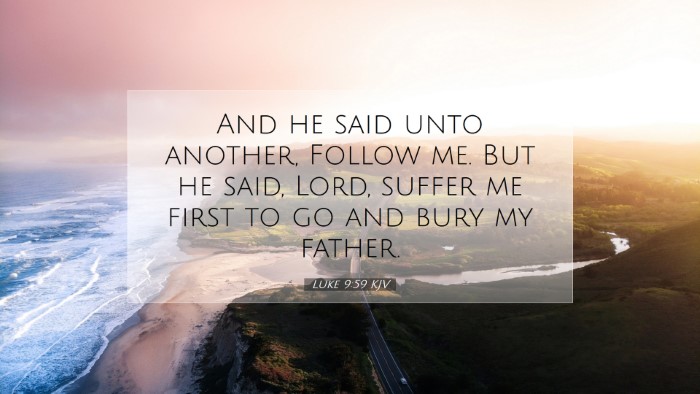Commentary on Luke 9:59
In Luke 9:59, Jesus addresses the implications of discipleship by responding to a man’s expression of willingness to follow Him after he has bid farewell to his family. This moment encapsulates the theme of commitment and the urgency of the call to discipleship.
Text of Luke 9:59
“But He said to him, 'Follow Me.' But he said, 'Lord, let me first go and bury my father.'”
Exegesis and Context
This verse appears in the context of Jesus' journey towards Jerusalem, where He has resolutely set His face (Luke 9:51). The narrative conveys a period of heightened demand for commitment to the mission of Jesus. The call to discipleship is no trivial matter; it demands an immediate response and prioritizes the spiritual over the earthly.
Matthew Henry’s Insights
Matthew Henry provides a robust understanding of the gravity of Jesus’ call. He highlights that Jesus’ response is not a dismissal of familial obligations but rather emphasizes that spiritual commitments should take precedence over earthly ties. Henry suggests that the man’s request to bury his father, while culturally significant, illustrates a hesitation that is counter to the decisive nature of true discipleship.
Albert Barnes’ Interpretation
Albert Barnes elaborates that the man's reluctance indicates a misinterpretation of the nature of following Christ. The phrase "let me first" signals a divided loyalty, as his priorities are not fully aligned with the exigencies of discipleship. Barnes stresses that the call to follow Christ is absolute and cannot be sidelined by worldly concerns.
Adam Clarke's Perspective
Adam Clarke provides additional depth by suggesting that the phrase “bury my father” could imply waiting for the father to die, which could lead to an indefinite delay in following Christ. Clarke posits that Jesus’ response challenges the man to consider how he values the call of God compared to familial duties and cultural expectations. It serves as a provocative reminder of the urgency of the gospel mission.
Thematic Analysis
- The Urgency of Discipleship: The commentary centers on the immediacy of Jesus’ call. Discipleship is not a gradual process but rather a decisive act that demands readiness and willingness to set aside personal agendas.
- Prioritization of God's Call: This passage challenges believers to evaluate their priorities. The call of God often requires sacrificing personal comforts and postponements.
- Understanding Cultural Relevance: The request to bury one's father indicates a cultural context where familial obligations were paramount. Yet, Christ’s reply transcends cultural expectations and underscores that spiritual pursuits take precedence.
Theological Implications
The theological implications derived from this verse are profound for pastors and theologians. This passage beckons an exploration of what it truly means to “follow” Jesus. It encapsulates the essence of radical commitment and the essence of putting God above all else.
- Cost of Discipleship: Luke 9:59 reflects the cost associated with true discipleship. It urges believers to confront the sacrifices required in their walk with God.
- Challenge of Competing Allegiances: The verse presents a challenge to prioritize spiritual over familial or social responsibilities. This is a recurring theme in Jesus' teaching on discipleship.
- The Nature of God’s Kingdom: Christ’s kingdom often challenges worldly understandings of duty and loyalty, inviting believers into a higher calling that may conflict with established social norms.
Practical Applications for Today
The contemporary applications of Luke 9:59 are relevant for modern-day believers and church leaders. This verse invites individuals to reflect on their commitments and encourages a decisive response to follow Christ.
- Personal Reflection: Believers are encouraged to assess what is holding them back from fully committing to Christ. What “burials” or distractions might be preventing immediate obedience?
- Encouragement for Leaders: Pastoral leaders can use this scripture to challenge congregants to not allow cultural or personal obligations to interfere with their relationship with God and their mission to share the gospel.
- Community Involvement: Churches might consider how they facilitate an environment that encourages immediate and active discipleship among their members.
Conclusion
Luke 9:59 serves as a poignant reminder of the demands of discipleship. The collective insights from Henry, Barnes, and Clarke underscore the necessity of prioritizing God's calling above all earthly concerns. This passage implores believers to embrace the sacrificial nature of following Christ, thereby modeling a commitment that transcends cultural obligations and personal comforts. As we reflect on discipleship, may we be inspired to respond without delay, fully embracing the transformative journey of faith.


